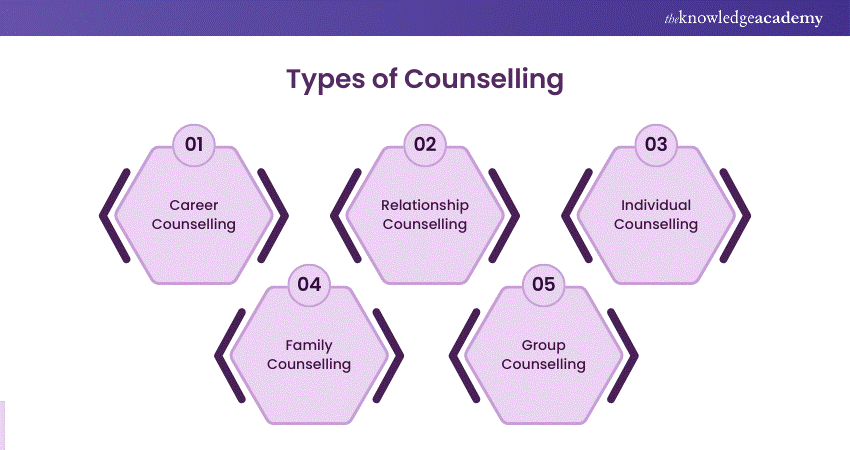low cost therapy online: Surprising Advantages for Mental Wellness
A Comprehensive Guide to the Various Types of Counselling and Their Effect
Therapy includes a selection of healing techniques, each developed to meet unique mental health requirements. From the organized methods of Cognitive-Behavioral Therapy to the understanding nature of Person-Centered Therapy, these techniques provide distinctive pathways to personal development. Family treatment and Dialectical Behavior modification supply additional frameworks for healing, while team therapy fosters area assistance. Recognizing these diverse approaches can brighten their profound influence on private well-being. What stays to be checked out are the complexities of each approach.

Comprehending Cognitive-Behavioral Therapy (CBT)
Although several restorative approaches exist, Cognitive-Behavioral Therapy (CBT) attracts attention as a result of its organized, goal-oriented nature. This form of therapy is based upon the facility that ideas, feelings, and habits are adjoined, and by transforming negative idea patterns, individuals can change their emotional responses and actions. CBT uses numerous methods, such as cognitive restructuring, which assists clients identify and challenge distorted ideas. Behavior activation urges involvement in enjoyable tasks to combat anxiety.
Usually, CBT is a short-term therapy, commonly lasting between 12 to 20 sessions, making it accessible for those seeking fast results. Its performance has been well-documented in dealing with anxiousness conditions, anxiety, and other mental health and wellness issues. The therapist's function is to guide clients via workouts and research projects, promoting self-awareness and advertising long-lasting coping techniques. This practical approach empowers people to take control of their mental health, eventually causing boosted life contentment.
Exploring Person-Centered Therapy
Person-Centered Therapy, established by Carl Rogers, offers a contrasting strategy to Cognitive-Behavioral Therapy by stressing the customer's subjective experience. This therapeutic model prioritizes the individual's point of view, cultivating an environment of compassion, genuine favorable respect, and credibility. By enabling customers to explore their sensations and ideas without judgment, therapists assist in individual development and self-discovery.
The core tenet of Person-Centered Therapy is the belief that individuals have the inherent capability for self-healing and individual growth. In this setting, the therapist works as an encouraging overview instead of an instruction authority, encouraging customers to take fee of their own journey. This method is especially effective for those coming to grips with problems such as reduced self-worth, stress and anxiety, or anxiety, as it encourages them to confront and recognize their feelings. Eventually, Person-Centered Treatment cultivates a strong restorative alliance, cultivating trust and visibility important for purposeful change.
The Function of Household Therapy in Recovery
Family members treatment works as an important component in the healing procedure for people and their partnerships. This restorative method focuses on enhancing interaction, settling problems, and fostering deeper links amongst household members. By attending to dysfunctional characteristics, family therapy urges each participant to share their ideas and feelings in a secure setting, advertising understanding and compassion.

The impact of family treatment prolongs beyond the sessions, as enhanced connections can lead to enhanced psychological health for all involved. Generally, family treatment plays an important role in healing by cultivating unity, strength, and common support amongst member of the family, ultimately assisting them towards a healthier, more meeting life together.
Unpacking Dialectical Behavior Modification (DBT)
Building on the structure of restorative methods that enhance emotional well-being, Dialectical Behavior modification (DBT) uses a structured framework for people dealing with extreme feelings and behavioral difficulties. Established by Marsha Linehan, DBT integrates cognitive-behavioral methods with mindfulness practices, aiming to aid customers manage overwhelming feelings and boost interpersonal efficiency.
The treatment is particularly helpful for those detected with Borderline Character Disorder but is additionally relevant to a variety of various other psychological health problems. adhd counselling. DBT includes individual therapy sessions and skills training groups, concentrating on 4 essential skill sets: mindfulness, distress tolerance, emotion guideline, and interpersonal performance
The Benefits of Team Coaching Procedure
While private treatment supplies valuable understandings, group therapy sessions supply one-of-a-kind benefits that can significantly improve the therapeutic experience. One vital benefit is the sense of area that arises among individuals. People typically discover comfort in sharing their experiences with others dealing with similar challenges, promoting a supportive environment that minimizes sensations of isolation.
Group sessions motivate diverse viewpoints, enabling participants to learn from each various other's coping approaches and insights. This collective wisdom can cause improved problem-solving capacities and a more comprehensive understanding of individual concerns.
Furthermore, team therapy typically advertises accountability, as members encourage each other to pursue their goals and follow their commitments. Finally, the cost-effectiveness of team treatment makes it an accessible choice for numerous people looking for assistance. Generally, the collaborative nature of team counseling sessions can significantly enhance the healing trip.
Regularly Asked Concerns
What Qualifications Do Therapists Need to Practice Counseling?
Therapists typically require a pertinent level in psychology or therapy, together with supervised scientific experience. Furthermore, they should acquire suitable licensure or certification to exercise lawfully, guaranteeing adherence to expert criteria and moral standards.
How Do I Pick the Right Kind Of Treatment for Me?
Picking the appropriate type of therapy entails examining personal needs, checking out various approaches, taking into consideration specialist specialties, and looking for referrals. Recognizing individual objectives and choices can greatly enhance the effectiveness and contentment of the therapeutic experience.

Are Online Therapy Procedure as Effective as In-Person Ones?
The effectiveness of online therapy sessions couples counselling compared to in-person ones often relies on private choices and conditions. Research study suggests that both techniques can produce positive outcomes, though some might find greater convenience in face-to-face communications.
How Lengthy Does Therapy Generally Last?

What Should I Expect During My First Therapy Session?
During the very first therapy session, clients can anticipate an introduction, conversation of their worries, facility of objectives, and a summary of the therapy process - relationship therapy. This preliminary conference intends to build connection and warranty convenience